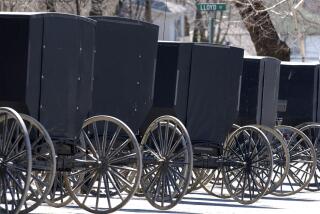Jehovah’s Witness ‘Shunning’ Upheld
- Share via
SAN FRANCISCO — The Jehovah’s Witnesses practice of “shunning” former members, believed to have been applied recently to singer Michael Jackson, was upheld Wednesday by a federal appeals court as an exercise of religious freedom.
The emotional harm suffered by one who is ostracized by friends and family must be tolerated by society under the Constitution “as a price well worth paying to safeguard the right of religious difference that all citizens enjoy,” said the U.S. 9th Circuit Court of Appeals in a case from Washington state.
The court said the principle of religious freedom required dismissal of a suit by an Alaska woman against the governing body of Jehovah’s Witnesses for ordering members to have nothing to do with former members.
Biblical Interpretation
The sect considers “shunning” to be required by biblical language on casting out apostates from the Christian community. It is also practiced by the Amish and Mennonites, the court said.
Under the practice, Jehovah’s Witnesses are forbidden, under pain of being ousted and shunned themselves, from having any contact with a former member. Family members are allowed an exemption for necessary family business.
When Jackson “disassociated” himself from the sect and his Woodland Hills congregation recently, his mother and other family members--under normal procedure--would have been expected to shun him. Neither the Witnesses nor spokesmen for the singer commented, however, on whether the rules were being applied in his case. But a California spokesman for the Witnesses acknowledged that the consequences of dropping out are “serious.”
“It’s a sad thing because there’s personal anguish involved, done unjustly under the cover of religious freedom,” said Robert Castrodale, lawyer for the plaintiff in the Washington suit, Janet Paul of Anchorage, Alaska.
Often, he said, the victim has grown up among Jehovah’s Witnesses and has no other family or friends.
More to Read
Sign up for Essential California
The most important California stories and recommendations in your inbox every morning.
You may occasionally receive promotional content from the Los Angeles Times.










